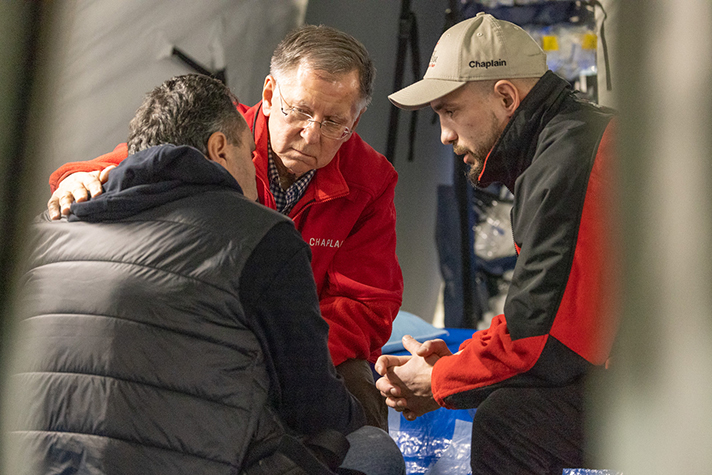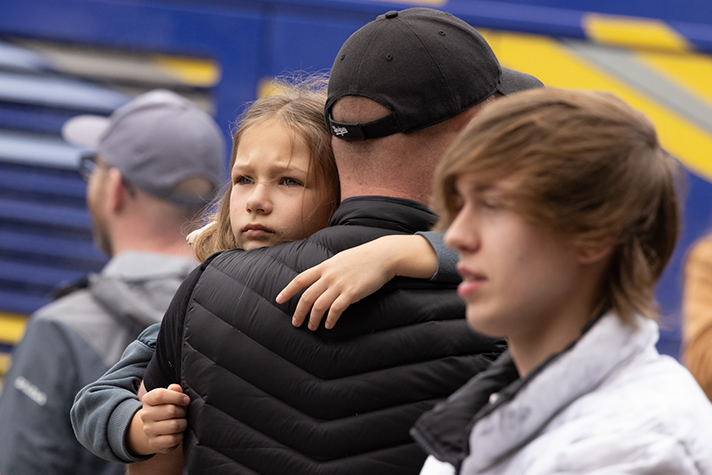
How can a ministry from the other side of the world reach millions of Ukrainians?
It’s a five loaves and two fish situation, if you’re familiar with the feeding of the 5,000 (Matthew 14:13-21). While it’s not quite physically possible to care for every individual in a war zone, there are other avenues to reach the masses virtually.
That’s why the Billy Graham Evangelistic Association (BGEA) recently created “God’s Hope in Crisis,” a free, 30-minute video training to help Ukrainians navigate trauma and grief.
>>Share the two-part video series, “God’s Hope in Crisis,” with Ukrainians you may know.
“What’s the one thing everyone has on them … even if they’ve lost everything?” said Mark Appleton, BGEA’s director of Internet Evangelism. “Most people still have a phone in their pocket. It’s their lifeline.”
Since February 24, more than 11 million Ukrainians have fled their homes due to the conflict. Many have left with only a small piece of luggage, kissing goodbye their husbands or sons, and unsure if they will have anything to return to. Others are hunkering down or fighting for their country, doing all they can to survive airstrikes.
Either way, every Ukrainian has faced trauma and grief. The first part of the “God’s Hope in Crisis” series acknowledges:
Grief is like a fingerprint. From afar, it is very similar to the others. But if we get closer, we will see that everyone has grief, and each grief is its own and there is no need to compare it.

The second section of the series helps those grieving see how they can encourage others in their pain.
“Our hope is [that this video series] presents a Biblical worldview about why God—Who could stop this [war] immediately—is allowing it to continue,” said Josh Holland, international director of the Billy Graham Rapid Response Team (BG-RRT).
Holland is helping mobilize dozens of chaplains who are ministering in three cities across Ukraine, including at a Samaritan’s Purse Emergency Field Hospital and medical clinics. He’s also been working to help train more than 100 Ukrainians to become Billy Graham chaplains, which will enable the ministry to further offer emotional and spiritual care without a language barrier.
>>[PHOTOS] An inside look at chaplains’ ministry in Ukraine
“We know war is just a result of fallen humanity,” continued Holland, who taught a similar course to church members while in Ukraine two months ago. “Unfortunately, sometimes when we’re at the lowest place in life, there’s more of an openness to God.”
Billy Graham chaplains have seen this openness over the past several weeks while serving in Ukraine, as many people have decided to start a relationship with God in the midst of their hardship.
“Our goal is as their world is completely turned upside down, families split up, they lost loved ones or had to leave a home they may never be coming back to, there would be an openness to the message God loves them,” Holland said.
Soon, multiple Ukrainian churches will receive an email with a link to this series, which will help equip them to share the love of God with others in crisis. While specifically geared toward Christians, the video clearly presents the Gospel message, giving access for anyone to come to know a loving Savior. The series is available in Russian as well.
A few weeks ago, BGEA’s Internet Evangelism team launched a website, enabling Russian speakers to hear the Gospel and chat with an online volunteer about spiritual questions. The Russian language ministry also has a presence on Facebook and Instagram. Appleton has been working alongside a ministry partner in Poland as well, helping Ukrainians access the Good News online.
“They can’t see it now, but God has a way,” Holland said. “And God will ultimately bring good out of the worst of tragedies, strengthen them and bring some kind of peace even though the situation is ongoing.”

